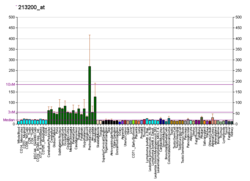突触素
位於人類X染色體的基因
突触素(Synaptophysin),又称主要突触小泡蛋白p38(major synaptic vesicle protein p38),是一种人体中由“SYP”基因翻译而成的蛋白质[6][7]。
遗传学
编辑该基因位于X染色体的短臂上(Xp11.23-p11.22),约由12,406个碱基对所构成,位于反义股上。该蛋白由313个氨基所构成,分子量约为33.845kDa。
分子生物学
编辑该蛋白质为突触小泡上的糖蛋白,拥有四个穿膜区。该蛋白主要表现于神经内分泌细胞,基本上只要拥有突触传输功能的神经元皆会表达。在免疫染色组织学上,该蛋白常被作为神经内分泌肿瘤的标志蛋白,或是用于突触丰度的定量[8]。
目前该蛋白的确切功能尚未阐明,仅知他会与重要的突触蛋白synaptobrevin产生交互作用。但在动物实验中,即使将突触素的基因敲除,似乎并没有对动物的发育或功能上产生任何影响[9]。近期研究显示,突触素的缺失可能导致小鼠出现行为异常,例如探索行为增加、新奇物辨识(object novelty recognition),以及空间感上产生影响[10]。
交互作用
编辑参见
编辑参考文献
编辑- ^ 與突觸素相關的疾病;在維基數據上查看/編輯參考.
- ^ 2.0 2.1 2.2 GRCh38: Ensembl release 89: ENSG00000102003 - Ensembl, May 2017
- ^ 3.0 3.1 3.2 GRCm38: Ensembl release 89: ENSMUSG00000031144 - Ensembl, May 2017
- ^ Human PubMed Reference:. National Center for Biotechnology Information, U.S. National Library of Medicine.
- ^ Mouse PubMed Reference:. National Center for Biotechnology Information, U.S. National Library of Medicine.
- ^ Entrez Gene: SYP synaptophysin. [2021-01-14]. (原始内容存档于2010-12-05).
- ^ Südhof TC, Lottspeich F, Greengard P, Mehl E, Jahn R. The cDNA and derived amino acid sequences for rat and human synaptophysin. Nucleic Acids Res. November 1987, 15 (22): 9607. PMC 306499 . PMID 3120152. doi:10.1093/nar/15.22.9607.
- ^ Calhoun ME, Jucker M, Martin LJ, Thinakaran G, Price DL, Mouton PR. Comparative evaluation of synaptophysin-based methods for quantification of synapses. J. Neurocytol. December 1996, 25 (12): 821–8. PMID 9023727. doi:10.1007/BF02284844. 温哥华格式错误 (帮助)
- ^ McMahon HT, Bolshakov VY, Janz R, Hammer RE, Siegelbaum SA, Südhof TC. Synaptophysin, a major synaptic vesicle protein, is not essential for neurotransmitter release. Proc. Natl. Acad. Sci. U.S.A. May 1996, 93 (10): 4760–4. Bibcode:1996PNAS...93.4760M. PMC 39352 . PMID 8643476. doi:10.1073/pnas.93.10.4760.
- ^ Schmitt U, Tanimoto N, Seeliger M, Schaeffel F, Leube RE. Detection of behavioral alterations and learning deficits in mice lacking synaptophysin. Neuroscience. August 2009, 162 (2): 234–43. CiteSeerX 10.1.1.320.5309 . PMID 19393300. doi:10.1016/j.neuroscience.2009.04.046.
- ^ Horikawa HP, Kneussel M, El Far O, Betz H. Interaction of synaptophysin with the AP-1 adaptor protein gamma-adaptin. Mol. Cell. Neurosci. November 2002, 21 (3): 454–62. PMID 12498786. doi:10.1006/mcne.2002.1191.
- ^ Wheeler TC, Chin LS, Li Y, Roudabush FL, Li L. Regulation of synaptophysin degradation by mammalian homologues of seven in absentia. J. Biol. Chem. March 2002, 277 (12): 10273–82. PMID 11786535. doi:10.1074/jbc.M107857200 .
延伸阅读
编辑- Kalina M, Lukinius A, Grimelius L, Höög A, Falkmer S. Ultrastructural localization of synaptophysin to the secretory granules of normal glucagon and insulin cells in human islets of Langerhans. Ultrastructural Pathology. 1991, 15 (3): 215–9. PMID 1908157. doi:10.3109/01913129109021883.
- Ozçelik T, Lafreniere RG, Archer BT, Johnston PA, Willard HF, Francke U, Südhof TC. Synaptophysin: structure of the human gene and assignment to the X chromosome in man and mouse. Am. J. Hum. Genet. 1990, 47 (3): 551–61. PMC 1683862 . PMID 1975480.
- Goto S, Hirano A, Pearson J. Calcineurin and synaptophysin in the human spinal cord of normal individuals and patients with familial dysautonomia. Acta Neuropathol. 1990, 79 (6): 647–52. PMID 2163183. doi:10.1007/BF00294243.
- de Koning JP, Schelen AM, Dong F, van Buitenen C, Burgering BM, Bos JL, Löwenberg B, Touw IP. Specific involvement of tyrosine 764 of human granulocyte colony-stimulating factor receptor in signal transduction mediated by p145/Shc/GRB2 or p90/GRB2 complexes. Blood. 1996, 87 (1): 132–40. PMID 8547634. doi:10.1182/blood.V87.1.132.132 .
- Zhang PJ, Rosenblum MK. Synaptophysin expression in the human spinal cord. Diagnostic implications of an immunohistochemical study. Am. J. Surg. Pathol. 1997, 20 (3): 273–6. PMID 8772779. doi:10.1097/00000478-199603000-00002.
- Bouwens L, Lu WG, De Krijger R. Proliferation and differentiation in the human fetal endocrine pancreas. Diabetologia. 1997, 40 (4): 398–404. PMID 9112016. doi:10.1007/s001250050693 .
- Fisher SE, Ciccodicola A, Tanaka K, Curci A, Desicato S, D'urso M, Craig IW. Sequence-based exon prediction around the synaptophysin locus reveals a gene-rich area containing novel genes in human proximal Xp. Genomics. 1998, 45 (2): 340–7. PMID 9344658. doi:10.1006/geno.1997.4941. hdl:11858/00-001M-0000-0012-CBE6-7 .
- Maggiano N, Lauriola L, Serra FG, Ricci R, Capelli A, Ranelletti FO. Detection of synaptophysin-producing cells in human thymus by immunohistochemistry and nonradioactive in situ hybridization. J. Histochem. Cytochem. 1999, 47 (2): 237–43. PMID 9889259. doi:10.1177/002215549904700212 .
- Portela-Gomes GM, Stridsberg M, Johansson H, Grimelius L. Co-localization of synaptophysin with different neuroendocrine hormones in the human gastrointestinal tract. Histochem. Cell Biol. 1999, 111 (1): 49–54. PMID 9930883. doi:10.1007/s004180050332.
- Davidsson P, Gottfries J, Bogdanovic N, Ekman R, Karlsson I, Gottfries CG, Blennow K. The synaptic-vesicle-specific proteins rab3a and synaptophysin are reduced in thalamus and related cortical brain regions in schizophrenic brains. Schizophrenia Research. 1999, 40 (1): 23–9. PMID 10541003. doi:10.1016/S0920-9964(99)00037-7.
- Cassiman D, van Pelt J, De Vos R, Van Lommel F, Desmet V, Yap SH, Roskams T. Synaptophysin: A Novel Marker for Human and Rat Hepatic Stellate Cells. Am. J. Pathol. 1999, 155 (6): 1831–9. PMC 1866940 . PMID 10595912. doi:10.1016/S0002-9440(10)65501-0.
- Thiele C, Hannah MJ, Fahrenholz F, Huttner WB. Cholesterol binds to synaptophysin and is required for biogenesis of synaptic vesicles. Nat. Cell Biol. 2000, 2 (1): 42–9. PMID 10620806. doi:10.1038/71366.
- Nag TC, Wadhwa S. Differential expression of syntaxin-1 and synaptophysin in the developing and adult human retina. J. Biosci. 2001, 26 (2): 179–91. PMID 11426054. doi:10.1007/BF02703642.
- Bhangu PS, Genever PG, Spencer GJ, Grewal TS, Skerry TM. Evidence for targeted vesicular glutamate exocytosis in osteoblasts. Bone. 2001, 29 (1): 16–23. PMID 11472886. doi:10.1016/S8756-3282(01)00482-3.
- Roudenok V, Kühnel W. The development of synaptophysin immunoreactivity in the human sympathetic ganglia. Ann. Anat. 2001, 183 (4): 345–51. PMID 11508360. doi:10.1016/S0940-9602(01)80177-1.
- Wheeler TC, Chin LS, Li Y, Roudabush FL, Li L. Regulation of synaptophysin degradation by mammalian homologues of seven in absentia. J. Biol. Chem. 2002, 277 (12): 10273–82. PMID 11786535. doi:10.1074/jbc.M107857200 .
- Ulfig N, Chan WY. Expression of a kinase anchoring protein 79 and synaptophysin in the developing human red nucleus. Neurosignals. 2003, 11 (2): 95–102. PMID 12077483. doi:10.1159/000058546.
- Yao I, Iida J, Nishimura W, Hata Y. Synaptic and nuclear localization of brain-enriched guanylate kinase-associated protein. J. Neurosci. 2002, 22 (13): 5354–64. PMC 6758191 . PMID 12097487. doi:10.1523/JNEUROSCI.22-13-05354.2002.
- Wistow G, Bernstein SL, Wyatt MK, Ray S, Behal A, Touchman JW, Bouffard G, Smith D, Peterson K. Expressed sequence tag analysis of human retina for the NEIBank Project: retbindin, an abundant, novel retinal cDNA and alternative splicing of other retina-preferred gene transcripts. Mol. Vis. 2002, 8: 196–204. PMID 12107411.




